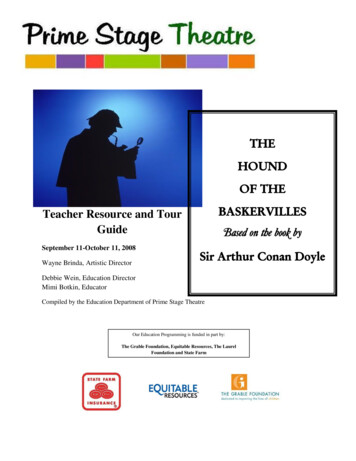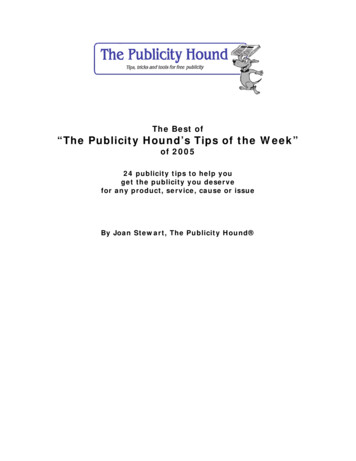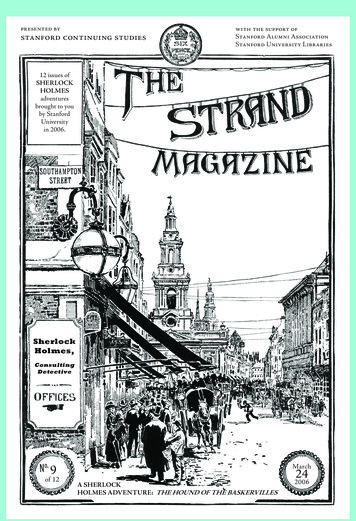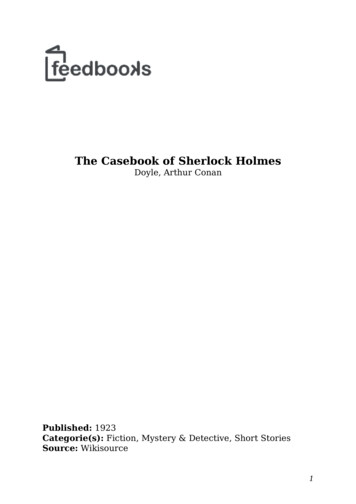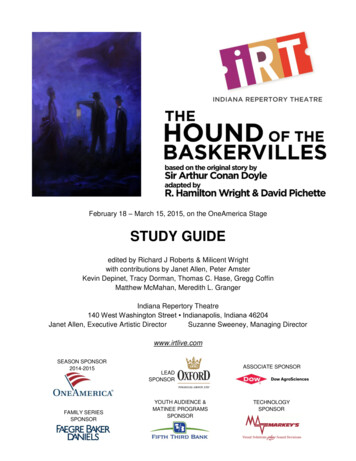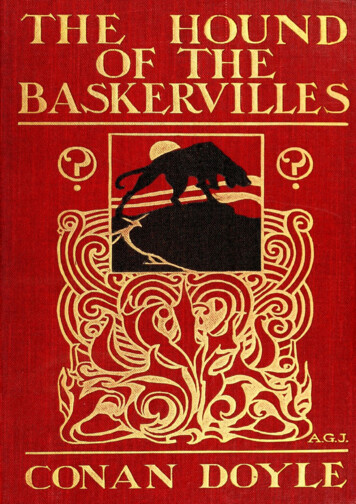
Transcription
THE HOUND OF THEBASKERVILLESSIR ARTHUR CONAN DOYLESAMPLE CREATED BY BAD DOGGIE DESIGNS
Project Gutenberg's The Hound of the Baskervilles, by Arthur Conan DoyleThis eBook is for the use of anyone anywhere at no cost and with almost norestrictions whatsoever. You may copy it, give it away or re-use it under theterms of the Project Gutenberg License included with this eBook or online atwww.gutenberg.org
CONTENTS1.2.3.4.5.6.7.Mr. Sherlock HolmesThe Curse of the BaskervillesThe ProblemSir Henry BaskervilleThree Broken ThreadsBaskerville HallThe Stapletons of Merripit House
1MR. SHERLOCK HOLMESM R . S HERLOCK H OLMES , WHO WAS USUALLY VERY LATE IN THE MORNINGS ,save upon those not infrequent occasions when he was up all night,was seated at the breakfast table. I stood upon the hearth-rug andpicked up the stick which our visitor had left behind him the nightbefore. It was a fine, thick piece of wood, bulbous-headed, of the sortwhich is known as a “Penang lawyer.” Just under the head was abroad silver band nearly an inch across. “To James Mortimer,M.R.C.S., from his friends of the C.C.H.,” was engraved upon it, withthe date “1884.” It was just such a stick as the old-fashioned familypractitioner used to carry—dignified, solid, and reassuring.“Well, Watson, what do you make of it?”Holmes was sitting with his back to me, and I had given him nosign of my occupation.“How did you know what I was doing? I believe you have eyes inthe back of your head.”“I have, at least, a well-polished, silver-plated coffee-pot in front ofme,” said he. “But, tell me, Watson, what do you make of our visitor'sstick? Since we have been so unfortunate as to miss him and have nonotion of his errand, this accidental souvenir becomes of importance.Let me hear you reconstruct the man by an examination of it.”“I think,” said I, following as far as I could the methods of mycompanion, “that Dr. Mortimer is a successful, elderly medical man,well-esteemed since those who know him give him this mark of theirappreciation.”“Good!” said Holmes. “Excellent!”“I think also that the probability is in favour of his being a countrypractitioner who does a great deal of his visiting on foot.”“Why so?”“Because this stick, though originally a very handsome one hasbeen so knocked about that I can hardly imagine a town practitioner
carrying it. The thick-iron ferrule is worn down, so it is evident that hehas done a great amount of walking with it.”“Perfectly sound!” said Holmes.“And then again, there is the 'friends of the C.C.H.' I should guessthat to be the Something Hunt, the local hunt to whose members hehas possibly given some surgical assistance, and which has made hima small presentation in return.”“Really, Watson, you excel yourself,” said Holmes, pushing backhis chair and lighting a cigarette. “I am bound to say that in all theaccounts which you have been so good as to give of my own smallachievements you have habitually underrated your own abilities. Itmay be that you are not yourself luminous, but you are a conductor oflight. Some people without possessing genius have a remarkablepower of stimulating it. I confess, my dear fellow, that I am very muchin your debt.”He had never said as much before, and I must admit that his wordsgave me keen pleasure, for I had often been piqued by his indifferenceto my admiration and to the attempts which I had made to givepublicity to his methods. I was proud, too, to think that I had so farmastered his system as to apply it in a way which earned his approval.He now took the stick from my hands and examined it for a fewminutes with his naked eyes. Then with an expression of interest helaid down his cigarette, and carrying the cane to the window, helooked over it again with a convex lens.“Interesting, though elementary,” said he as he returned to hisfavourite corner of the settee. “There are certainly one or twoindications upon the stick. It gives us the basis for several deductions.”“Has anything escaped me?” I asked with some self-importance. “Itrust that there is nothing of consequence which I have overlooked?”“I am afraid, my dear Watson, that most of your conclusions wereerroneous. When I said that you stimulated me I meant, to be frank,that in noting your fallacies I was occasionally guided towards thetruth. Not that you are entirely wrong in this instance. The man iscertainly a country practitioner. And he walks a good deal.”“Then I was right.”“To that extent.”“But that was all.”“No, no, my dear Watson, not all—by no means all. I wouldsuggest, for example, that a presentation to a doctor is more likely tocome from a hospital than from a hunt, and that when the initials'C.C.' are placed before that hospital the words 'Charing Cross' verynaturally suggest themselves.”“You may be right.”“The probability lies in that direction. And if we take this as a
working hypothesis we have a fresh basis from which to start ourconstruction of this unknown visitor.”“Well, then, supposing that 'C.C.H.' does stand for 'Charing CrossHospital,' what further inferences may we draw?”“Do none suggest themselves? You know my methods. Applythem!”“I can only think of the obvious conclusion that the man haspractised in town before going to the country.”“I think that we might venture a little farther than this. Look at it inthis light. On what occasion would it be most probable that such apresentation would be made? When would his friends unite to givehim a pledge of their good will? Obviously at the moment when Dr.Mortimer withdrew from the service of the hospital in order to start inpractice for himself. We know there has been a presentation. Webelieve there has been a change from a town hospital to a countrypractice. Is it, then, stretching our inference too far to say that thepresentation was on the occasion of the change?”“It certainly seems probable.”“Now, you will observe that he could not have been on the staff ofthe hospital, since only a man well-established in a London practicecould hold such a position, and such a one would not drift into thecountry. What was he, then? If he was in the hospital and yet not onthe staff he could only have been a house-surgeon or a housephysician—little more than a senior student. And he left five years ago—the date is on the stick. So your grave, middle-aged familypractitioner vanishes into thin air, my dear Watson, and there emergesa young fellow under thirty, amiable, unambitious, absent-minded,and the possessor of a favourite dog, which I should describe roughlyas being larger than a terrier and smaller than a mastiff.”I laughed incredulously as Sherlock Holmes leaned back in hissettee and blew little wavering rings of smoke up to the ceiling.“As to the latter part, I have no means of checking you,” said I,“but at least it is not difficult to find out a few particulars about theman's age and professional career.” From my small medical shelf Itook down the Medical Directory and turned up the name. There wereseveral Mortimers, but only one who could be our visitor. I read hisrecord aloud.“Mortimer, James, M.R.C.S., 1882, Grimpen, Dartmoor, Devon.House-surgeon, from 1882 to 1884, at Charing Cross Hospital. Winnerof the Jackson prize for Comparative Pathology, with essay entitled 'IsDisease a Reversion?' Corresponding member of the SwedishPathological Society. Author of 'Some Freaks of Atavism' (Lancet1882). 'Do We Progress?' (Journal of Psychology, March, 1883).Medical Officer for the parishes of Grimpen, Thorsley, and High
Barrow.”“No mention of that local hunt, Watson,” said Holmes with amischievous smile, “but a country doctor, as you very astutelyobserved. I think that I am fairly justified in my inferences. As to theadjectives, I said, if I remember right, amiable, unambitious, andabsent-minded. It is my experience that it is only an amiable man inthis world who receives testimonials, only an unambitious one whoabandons a London career for the country, and only an absent-mindedone who leaves his stick and not his visiting-card after waiting an hourin your room.”“And the dog?”“Has been in the habit of carrying this stick behind his master.Being a heavy stick the dog has held it tightly by the middle, and themarks of his teeth are very plainly visible. The dog's jaw, as shown inthe space between these marks, is too broad in my opinion for a terrierand not broad enough for a mastiff. It may have been—yes, by Jove, itis a curly-haired spaniel.”He had risen and paced the room as he spoke. Now he halted inthe recess of the window. There was such a ring of conviction in hisvoice that I glanced up in surprise.“My dear fellow, how can you possibly be so sure of that?”“For the very simple reason that I see the dog himself on our verydoor-step, and there is the ring of its owner. Don't move, I beg you,Watson. He is a professional brother of yours, and your presence maybe of assistance to me. Now is the dramatic moment of fate, Watson,when you hear a step upon the stair which is walking into your life,and you know not whether for good or ill. What does Dr. JamesMortimer, the man of science, ask of Sherlock Holmes, the specialist incrime? Come in!”The appearance of our visitor was a surprise to me, since I hadexpected a typical country practitioner. He was a very tall, thin man,with a long nose like a beak, which jutted out between two keen, grayeyes, set closely together and sparkling brightly from behind a pair ofgold-rimmed glasses. He was clad in a professional but rather slovenlyfashion, for his frock-coat was dingy and his trousers frayed. Thoughyoung, his long back was already bowed, and he walked with aforward thrust of his head and a general air of peering benevolence.As he entered his eyes fell upon the stick in Holmes's hand, and he rantowards it with an exclamation of joy. “I am so very glad,” said he. “Iwas not sure whether I had left it here or in the Shipping Office. Iwould not lose that stick for the world.”“A presentation, I see,” said Holmes.“Yes, sir.”“From Charing Cross Hospital?”
“From one or two friends there on the occasion of my marriage.”“Dear, dear, that's bad!” said Holmes, shaking his head.Dr. Mortimer blinked through his glasses in mild astonishment.“Why was it bad?”“Only that you have disarranged our little deductions. Yourmarriage, you say?”“Yes, sir. I married, and so left the hospital, and with it all hopes ofa consulting practice. It was necessary to make a home of my own.”“Come, come, we are not so far wrong, after all,” said Holmes.“And now, Dr. James Mortimer ———”“Mister, sir, Mister—a humble M.R.C.S.”“And a man of precise mind, evidently.”“A dabbler in science, Mr. Holmes, a picker up of shells on theshores of the great unknown ocean. I presume that it is Mr. SherlockHolmes whom I am addressing and not ———”“No, this is my friend Dr. Watson.”“Glad to meet you, sir. I have heard your name mentioned inconnection with that of your friend. You interest me very much, Mr.Holmes. I had hardly expected so dolichocephalic a skull or such wellmarked supra-orbital development. Would you have any objection tomy running my finger along your parietal fissure? A cast of your skull,sir, until the original is available, would be an ornament to anyanthropological museum. It is not my intention to be fulsome, but Iconfess that I covet your skull.”Sherlock Holmes waved our strange visitor into a chair. “You arean enthusiast in your line of thought, I perceive, sir, as I am in mine,”said he. “I observe from your forefinger that you make your owncigarettes. Have no hesitation in lighting one.”The man drew out paper and tobacco and twirled the one up in theother with surprising dexterity. He had long, quivering fingers as agileand restless as the antennae of an insect.Holmes was silent, but his little darting glances showed me theinterest which he took in our curious companion.“I presume, sir,” said he at last, “that it was not merely for thepurpose of examining my skull that you have done me the honour tocall here last night and again to-day?”“No, sir, no; though I am happy to have had the opportunity ofdoing that as well. I came to you, Mr. Holmes, because I recognizedthat I am myself an unpractical man and because I am suddenlyconfronted with a most serious and extraordinary problem.Recognizing, as I do, that you are the second highest expert in Europe———”“Indeed, sir! May I inquire who has the honour to be the first?”asked Holmes with some asperity.
“To the man of precisely scientific mind the work of MonsieurBertillon must always appeal strongly.”“Then had you not better consult him?”“I said, sir, to the precisely scientific mind. But as a practical man ofaffairs it is acknowledged that you stand alone. I trust, sir, that I havenot inadvertently ———”“Just a little,” said Holmes. “I think, Dr. Mortimer, you would dowisely if without more ado you would kindly tell me plainly what theexact nature of the problem is in which you demand my assistance.”
2THE CURSE OF THE BASKERVILLES“I HAVE IN MY POCKET A MANUSCRIPT ,” SAID D R . J AMES M ORTIMER .“I observed it as you entered the room,” said Holmes.“It is an old manuscript.”“Early eighteenth century, unless it is a forgery.”“How can you say that, sir?”“You have presented an inch or two of it to my examination all thetime that you have been talking. It would be a poor expert who couldnot give the date of a document within a decade or so. You maypossibly have read my little monograph upon the subject. I put that at1730.”“The exact date is 1742.” Dr. Mortimer drew it from his breastpocket. “This family paper was committed to my care by Sir CharlesBaskerville, whose sudden and tragic death some three months agocreated so much excitement in Devonshire. I may say that I was hispersonal friend as well as his medical attendant. He was a strongminded man, sir, shrewd, practical, and as unimaginative as I ammyself. Yet he took this document very seriously, and his mind wasprepared for just such an end as did eventually overtake him.”Holmes stretched out his hand for the manuscript and flattened itupon his knee.“You will observe, Watson, the alternative use of the long s and theshort. It is one of several indications which enabled me to fix the date.”I looked over his shoulder at the yellow paper and the faded script.At the head was written: “Baskerville Hall,” and below in large,scrawling figures: “1742.”“It appears to be a statement of some sort.”“Yes, it is a statement of a certain legend which runs in theBaskerville family.”“But I understand that it is something more modern and practicalupon which you wish to consult me?”
“Most modern. A most practical, pressing matter, which must bedecided within twenty-four hours. But the manuscript is short and isintimately connected with the affair. With your permission I will readit to you.”Holmes leaned back in his chair, placed his finger-tips together,and closed his eyes, with an air of resignation. Dr. Mortimer turnedthe manuscript to the light and read in a high, cracking voice thefollowing curious, old-world narrative:—“Of the origin of the Hound of the Baskervilles there have beenmany statements, yet as I come in a direct line from Hugo Baskerville,and as I had the story from my father, who also had it from his, I haveset it down with all belief that it occurred even as is here set forth. AndI would have you believe, my sons, that the same Justice whichpunishes sin may also most graciously forgive it, and that no ban is soheavy but that by prayer and repentance it may be removed. Learnthen from this story not to fear the fruits of the past, but rather to becircumspect in the future, that those foul passions whereby our familyhas suffered so grievously may not again be loosed to our undoing.“Know then that in the time of the Great Rebellion (the history ofwhich by the learned Lord Clarendon I most earnestly commend toyour attention) this Manor of Baskerville was held by Hugo of thatname, nor can it be gainsaid that he was a most wild, profane, andgodless man. This, in truth, his neighbours might have pardoned,seeing that saints have never flourished in those parts, but there wasin him a certain wanton and cruel humour which made his name abyword through the West. It chanced that this Hugo came to love (if,indeed, so dark a passion may be known under so bright a name) thedaughter of a yeoman who held lands near the Baskerville estate. Butthe young maiden, being discreet and of good repute, would everavoid him, for she feared his evil name. So it came to pass that oneMichaelmas this Hugo, with five or six of his idle and wickedcompanions, stole down upon the farm and carried off the maiden, herfather and brothers being from home, as he well knew. When they hadbrought her to the Hall the maiden was placed in an upper chamber,while Hugo and his friends sat down to a long carouse, as was theirnightly custom. Now, the poor lass upstairs was like to have her witsturned at the singing and shouting and terrible oaths which came upto her from below, for they say that the words used by HugoBaskerville, when he was in wine, were such as might blast the manwho said them. At last in the stress of her fear she did that whichmight have daunted the bravest or most active man, for by the aid ofthe growth of ivy which covered (and still covers) the south wall shecame down from under the eaves, and so homeward across the moor,there being three leagues betwixt the Hall and her father's farm.
“It chanced that some little time later Hugo left his guests to carryfood and drink—with other worse things, perchance—to his captive,and so found the cage empty and the bird escaped. Then, as it wouldseem, he became as one that hath a devil, for, rushing down the stairsinto the dining-hall, he sprang upon the great table, flagons andtrenchers flying before him, and he cried aloud before all the companythat he would that very night render his body and soul to the Powersof Evil if he might but overtake the wench. And while the revellersstood aghast at the fury of the man, one more wicked or, it may be,more drunken than the rest, cried out that they should put the houndsupon her. Whereat Hugo ran from the house, crying to his grooms thatthey should saddle his mare and unkennel the pack, and giving thehounds a kerchief of the maid's, he swung them to the line, and so offfull cry in the moonlight over the moor.“Now, for some space the revellers stood agape, unable tounderstand all that had been done in such haste. But anon theirbemused wits awoke to the nature of the deed which was like to bedone upon the moorlands. Everything was now in an uproar, somecalling for their pistols, some for their horses, and some for anotherflask of wine. But at length some sense came back to their crazedminds, and the whole of them, thirteen in number, took horse andstarted in pursuit. The moon shone clear above them, and they rodeswiftly abreast, taking that course which the maid must needs havetaken if she were to reach her own home.“They had gone a mile or two when they passed one of the nightshepherds upon the moorlands, and they cried to him to know if hehad seen the hunt. And the man, as the story goes, was so crazed withfear that he could scarce speak, but at last he said that he had indeedseen the unhappy maiden, with the hounds upon her track. 'But I haveseen more than that,' said he, 'for Hugo Baskerville passed me uponhis black mare, and there ran mute behind him such a hound of hell asGod forbid should ever be at my heels.' So the drunken squires cursedthe shepherd and rode onward. But soon their skins turned cold, forthere came a galloping across the moor, and the black mare, dabbledwith white froth, went past with trailing bridle and empty saddle.Then the revellers rode close together, for a great fear was on them,but they still followed over the moor, though each, had he been alone,would have been right glad to have turned his horse's head. Ridingslowly in this fashion they came at last upon the hounds. These,though known for their valour and their breed, were whimpering in acluster at the head of a deep dip or goyal, as we call it, upon the moor,some slinking away and some, with starting hackles and staring eyes,gazing down the narrow valley before them.“The company had come to a halt, more sober men, as you may
guess, than when they started. The most of them would by no meansadvance, but three of them, the boldest, or it may be the most drunken,rode forward down the goyal. Now, it opened into a broad space inwhich stood two of those great stones, still to be seen there, whichwere set by certain forgotten peoples in the days of old. The moon wasshining bright upon the clearing, and there in the centre lay theunhappy maid where she had fallen, dead of fear and of fatigue. But itwas not the sight of her body, nor yet was it that of the body of HugoBaskerville lying near her, which raised the hair upon the heads ofthese three daredevil roysterers, but it was that, standing over Hugo,and plucking at his throat, there stood a foul thing, a great, blackbeast, shaped like a hound, yet larger than any hound that ever mortaleye has rested upon. And even as they looked the thing tore the throatout of Hugo Baskerville, on which, as it turned its blazing eyes anddripping jaws upon them, the three shrieked with fear and rode fordear life, still screaming, across the moor. One, it is said, died that verynight of what he had seen, and the other twain were but broken menfor the rest of their days.“Such is the tale, my sons, of the coming of the hound which is saidto have plagued the family so sorely ever since. If I have set it down itis because that which is clearly known hath less terror than that whichis but hinted at and guessed. Nor can it be denied that many of thefamily have been unhappy in their deaths, which have been sudden,bloody, and mysterious. Yet may we shelter ourselves in the infinitegoodness of Providence, which would not forever punish the innocentbeyond that third or fourth generation which is threatened in HolyWrit. To that Providence, my sons, I hereby commend you, and Icounsel you by way of caution to forbear from crossing the moor inthose dark hours when the powers of evil are exalted.“[This from Hugo Baskerville to his sons Rodger and John, withinstructions that they say nothing thereof to their sister Elizabeth.]”When Dr. Mortimer had finished reading this singular narrative hepushed his spectacles up on his forehead and stared across at Mr.Sherlock Holmes. The latter yawned and tossed the end of his cigaretteinto the fire.“Well?” said he.“Do you not find it interesting?”“To a collector of fairy tales.”Dr. Mortimer drew a folded newspaper out of his pocket.“Now, Mr. Holmes, we will give you something a little morerecent. This is the Devon County Chronicle of May 14th of this year. Itis a short account of the facts elicited at the death of Sir CharlesBaskerville which occurred a few days before that date.”My friend leaned a little forward and his expression became intent.
Our visitor readjusted his glasses and began:—“The recent sudden death of Sir Charles Baskerville, whose namehas been mentioned as the probable Liberal candidate for Mid-Devonat the next election, has cast a gloom over the county. Though SirCharles had resided at Baskerville Hall for a comparatively shortperiod his amiability of character and extreme generosity had won theaffection and respect of all who had been brought into contact withhim. In these days of nouveaux riches it is refreshing to find a casewhere the scion of an old county family which has fallen upon evildays is able to make his own fortune and to bring it back with him torestore the fallen grandeur of his line. Sir Charles, as is well known,made large sums of money in South African speculation. More wisethan those who go on until the wheel turns against them, he realizedhis gains and returned to England with them. It is only two years sincehe took up his residence at Baskerville Hall, and it is common talkhow large were those schemes of reconstruction and improvementwhich have been interrupted by his death. Being himself childless, itwas his openly expressed desire that the whole country-side should,within his own lifetime, profit by his good fortune, and many willhave personal reasons for bewailing his untimely end. His generousdonations to local and county charities have been frequentlychronicled in these columns.“The circumstances connected with the death of Sir Charles cannotbe said to have been entirely cleared up by the inquest, but at leastenough has been done to dispose of those rumours to which localsuperstition has given rise. There is no reason whatever to suspect foulplay, or to imagine that death could be from any but natural causes.Sir Charles was a widower, and a man who may be said to have beenin some ways of an eccentric habit of mind. In spite of his considerablewealth he was simple in his personal tastes, and his indoor servants atBaskerville Hall consisted of a married couple named Barrymore, thehusband acting as butler and the wife as housekeeper. Their evidence,corroborated by that of several friends, tends to show that Sir Charles'shealth has for some time been impaired, and points especially to someaffection of the heart, manifesting itself in changes of colour,breathlessness, and acute attacks of nervous depression. Dr. JamesMortimer, the friend and medical attendant of the deceased, has givenevidence to the same effect.“The facts of the case are simple. Sir Charles Baskerville was in thehabit every night before going to bed of walking down the famousYew Alley of Baskerville Hall. The evidence of the Barrymores showsthat this had been his custom. On the 4th of May Sir Charles haddeclared his intention of starting next day for London, and hadordered Barrymore to prepare his luggage. That night he went out as
usual for his nocturnal walk, in the course of which he was in the habitof smoking a cigar. He never returned. At twelve o'clock Barrymore,finding the hall door still open, became alarmed, and, lighting alantern, went in search of his master. The day had been wet, and SirCharles's footmarks were easily traced down the Alley. Half-waydown this walk there is a gate which leads out on to the moor. Therewere indications that Sir Charles had stood for some little time here.He then proceeded down the Alley, and it was at the far end of it thathis body was discovered. One fact which has not been explained is thestatement of Barrymore that his master's footprints altered theircharacter from the time that he passed the moor-gate, and that heappeared from thence onward to have been walking upon his toes.One Murphy, a gipsy horse-dealer, was on the moor at no greatdistance at the time, but he appears by his own confession to havebeen the worse for drink. He declares that he heard cries, but is unableto state from what direction they came. No signs of violence were to bediscovered upon Sir Charles's person, and though the doctor'sevidence pointed to an almost incredible facial distortion—so greatthat Dr. Mortimer refused at first to believe that it was indeed hisfriend and patient who lay before him—it was explained that that is asymptom which is not unusual in cases of dyspnoea and death fromcardiac exhaustion. This explanation was borne out by the postmortem examination, which showed long-standing organic disease,and the coroner's jury returned a verdict in accordance with themedical evidence. It is well that this is so, for it is obviously of theutmost importance that Sir Charles's heir should settle at the Hall andcontinue the good work which has been so sadly interrupted. Had theprosaic finding of the coroner not finally put an end to the romanticstories which have been whispered in connection with the affair, itmight have been difficult to find a tenant for Baskerville Hall. It isunderstood that the next of kin is Mr. Henry Baskerville, if he be stillalive, the son of Sir Charles Baskerville's younger brother. The youngman when last heard of was in America, and inquiries are beinginstituted with a view to informing him of his good fortune.”Dr. Mortimer refolded his paper and replaced it in his pocket.“Those are the public facts, Mr. Holmes, in connection with thedeath of Sir Charles Baskerville.”“I must thank you,” said Sherlock Holmes, “for calling myattention to a case which certainly presents some features of interest. Ihad observed some newspaper comment at the time, but I wasexceedingly preoccupied by that little affair of the Vatican cameos, andin my anxiety to oblige the Pope I lost touch with several interestingEnglish cases. This article, you say, contains all the public facts?”“It does.”
“Then let me have the private ones.” He leaned back, put hisfinger-tips together, and assumed his most impassive and judicialexpression.“In doing so,” said Dr. Mortimer, who had begun to show signs ofsome strong emotion, “I am telling that which I have not confided toanyone. My motive for withholding it from the coroner's inquiry isthat a man of science shrinks from placing himself in the publicposition of seeming to indorse a popular superstition. I had the furthermotive that Baskerville Hall, as the paper says, would certainly remainuntenanted if anything were done to increase its already rather grimreputation. For both these reasons I thought that I was justified intelling rather less than I knew, since no practical good could resultfrom it, but with you there is no reason why I should not be perfectlyfrank.“The moor is very sparsely inhabited, and those who live near eachother are thrown very much together. For this reason I saw a gooddeal of Sir Charles Baskerville. With the exception of Mr. Frankland, ofLafter Hall, and Mr. Stapleton, the naturalist, there are no other men ofeducation within many miles. Sir Charles was a retiring man, but thechance of his illness brought us together, and a community of interestsin s
Project Gutenberg's The Hound of the Baskervilles, by Arthur Conan Doyle This eBook is for the use of anyone anywhere at no cost and with almost no restrictions whatsoever. You may copy it, give it away or re-use it under the terms of the Project Gutenberg License included with this eBook or online at www.gutenberg.org
